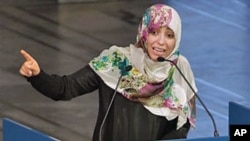Nobel Peace Prize winner Tawakkol Karman of Yemen says her country could be pushed into a civil war unless the West stops supporting the current transition and takes strong legal and financial action against President Ali Abdullah Saleh. Karman met with Britain’s foreign secretary and other senior officials on Thursday.
Karman says she told Foreign Secretary William Hague that the current 90-day waiting period, between Yemeni President Ali Abdullah Saleh’s resignation and his departure from office, is a very dangerous time. She told reporters she and her fellow-activists reject the deal negotiated by the Gulf Cooperation Council, and she told the foreign secretary that Britain and the West should stop supporting it.
“Three months is a long time. It means, enter Yemen to civil war. And I warn you because you are silent, you encourage him by your silence to do that,” she said.
Karman, who received the Nobel Peace Prize on Saturday in Oslo, came to London to meet with officials and members of the Yemeni exile community, and to promote her cause through a series of public events.
At a news conference at the Council for Arab-British Understanding, she called on Britain and other western governments to freeze the assets of Saleh and his supporters, to prosecute Saleh through the International Criminal Court and to launch an investigation of the Saleh regime, as called for in a UN Security Council resolution passed in October.
“Britain’s government, they have to take their responsibility. And they have to be clever, not stupid. Please don’t play with Ali Saleh. Don’t give him a chance to cheat you more and more and more,” said Karman.
Karman says Foreign Secretary Hague told her Britain wants to wait and see how Saleh behaves during the 90-day transition period. But Karman told him Saleh is already not doing what he is supposed to do. And she called on Britain to “re-examine” its position.
She also criticized the Gulf plan, saying it gives Saleh immunity he doesn’t deserve, calls on the demonstrators to leave their encampment in Sana’a, and will create a paralyzed transitional government and an undemocratic election with only one candidate. That candidate is to be Vice President Abd-Rabbu Mansour Hadi, who Karman calls a puppet of Saleh.
“Is this the democracy that we are struggling for, that we paid thousands of blood, killed people and injured in the street for this? Where is the accountability? For giving him the immunity, where is the democracy? One candidate, which is Abd-Rabbu Mansour Hadi, where is the press freedom and the human rights? Taking the demonstrations out, what is that? So, yes we are against that and we are not part of this initiative,” she said.
Karman said the demonstrations will continue to protest the transition plan.
She is the first Arab woman and, at age 32, the youngest person ever to win the Nobel Peace Prize. She received it along with Liberian President Ellen Johnson Sirleaf and Liberian activist Leymah Gbowee.
Nobel Winner Says Yemen Could Face Civil War
- By Al Pessin




